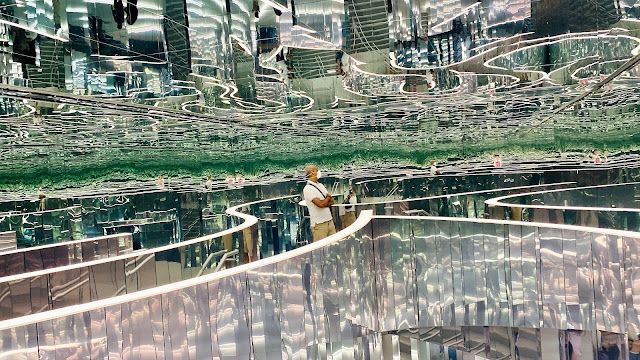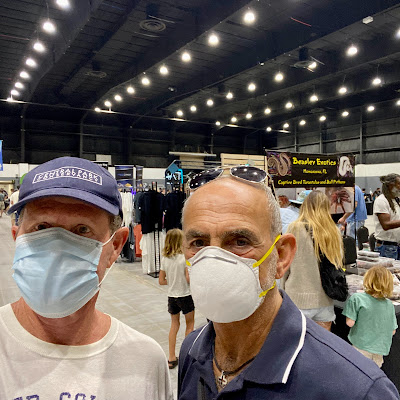Sunday, February 27, 2022
Artistic Tanning
Monday, February 21, 2022
The Great Mistake (5*)
So many mistakes, so little time! Corrupt Boss Tweed lives on, the father of New York Andrew Haswell Green does not. So it goes in Jonathan Lee's wonderful contemplation on an historic irony which ostensibly refers to an assassin killing Green--the wrong man--because of a madam's code name.
When I think of Central Park, one of the places I love most in the world, I credit Frederick Law Olmsted and Calvert Vaux, not Green, who actually got it built, along with the Metropolitan Museum of Art, the American Museum of Natural History, the New York Public Library and the Bronx Zoo. Who knew?
But what makes Green's story resonate even more for this reader is the subtly expressed idea that sublimation may have been the primary force behind the man's incredible accomplishments. That and the kind of father who told him to hold an ax like a man and that "only dogs want for approval."
You see, Lee writes Green as a gay character. Not only that, he imagines that he and Samuel Tilden, whose presidency was stolen from the American voters by the Electoral College (yet another great mistake!) were lovers, albeit chaste ones by today's standards. Here's how the dashing Tilden first appears to Green when they encounter each other for the first time:
He had never in his life met a man who spoke so openly of wants.
Tilden soon begins mentoring the slightly younger Green, a quick study, who identifies the future governor's 19th-century privilege.
In Andrew’s company Samuel generally chose to elide the parts of his own history that did not fit this country-boy narrative, but they had a way of leaking out: a childhood friendship with the Van Burens, the constant house visits from prominent politicians, the expensive education and refined apartment and access to country homes. And at other times, when it suited him, in the company of flashy friends such as John Bigelow, such leaks were not accidental, Andrew observed. Samuel turned on the faucet himself, his privilege becoming the center of the whole conversation. It drenched every topic it touched [emphasis mine].
But Tilden drops Green after tongues begin wagging when they're seen too often in the library together. Utterly adrift, Green endures an awful passage to Trinidad, vividly evoked by Lee, where he increases the efficiency of sugar cane farming, launches a Sunday school and learns two formative lessons that eventually fuel his ascent after his return to New York.
He was landing on the conclusion that all of life was a question not of faith but of first impressions. It was all about how those impressions were planted and farmed.
Receipt of a mistaken kiss from his homophobic supervisor impresses upon him the earlier necessity of Tilden's excessive caution, but neither man can entirely forsake their attraction to one another.
Samuel swallowed hard, his Adam’s apple doing a dance, and his hand briefly reached for Andrew’s knee. Limited intimacy, as if by accident. A person who loved to hide behind the possibility that a deliberate gesture was an innocent error. Andrew watched as the hand was withdrawn. Watched, too, his own knee trembling just a little in the aftermath. He still had a sense sometimes, so sharp it almost hurt, of his own body being beyond the fringes of his control. As if it were a ghost which both was and was not him, following its own inclinations toward appearance and disturbance.
Lee mostly skips a play-by-play of Green's steady rise as the "man who gets things done." Instead, he emphasizes his modesty and decency as Green looks back at his long, productive life in the weeks before his murder:
It was funny how your whole past came into play as you worked toward a future. The concert of barely connected moments that make up any life. No one experience can be unlinked from the next. There were times when his own past lives were the only ghosts he needed to visit for advice.
But in the penultimate chapter, while Green and Tilden are deep below the east river, touring the caissons that will support the first bridge to connect Brooklyn to Manhattan, Green has the kind epiphany, accompanied by an unsentimental qualification, that delivers Lee's lovely, emotional sucker punch:
Parks. Bridges. Great institutions. Art. They were the only affordable forms of immortality Andrew had ever been able to imagine in his adult life. And yet it occurred to him here, briefly, pointlessly, belatedly, with the airy abstraction of a weather forecast, that all this public work might not mean as much as having a friend holding your hand as you die.
Love. This was the way not to fall into forgetting. Love, and a good publicist.
Robert Caro served that function for New York's other master builder, Robert Moses. Now Jonathan Lee has given Andrew Haswell Green his due even as he slyly acknowledges his greatest mistake. Visiting the bench inscribed with his name in Central Park will be my first priority upon return!
May 16, 2022
Some asshole with a can of black spray paint spoiled my appreciation for New York City's only memorial to Andrew Haswell Green. Show some respect, man!
August 16, 2022
Father of Greater New York, This Eminence Was Named Andrew H. Green Hill
These Five Symbolical Trees were Planted and This Seat Was Erected
Thursday, February 10, 2022
SUPERBLUE Miami
The much-hyped SUPERBLUE Miami opened shortly after Thom and I left Lake Worth last spring.
Still, an "immersive" (if expensive @ $36 per head!) experience sounded fun and it got us out of the Folly for an afternoon.
But I'm not sure I'd call it art. The "curators" claimed that interactivity made teamLab's fields of flowers unique for each viewer. Video captures the environment much better than still photos.
Doesn't Thom look like a sperm in Everything You Always Wanted to Know about Sex?
Sunday, February 6, 2022
Black Deutschland (4*)
What's not to like? Berlin, my favorite European city, filtered through a gay black intellectual's consciousness during the years before the Wall fell in what must be a deeply autobiographical novel. Darryl Pinckney may be a little hard to follow at times as he alternates between Jed's African American upbringing in Chicago and his expatriate life in what he describes as "the involuntary island" and "the retirement community of the '68 generation" but picking your way through the deeper thickets of his prolifically critical mind often yields some of the sweetest berries.
I particularly enjoyed hearing his father's pithy black maxims, who characterizes philandering like this:
He loved the flashlight more than he did the hearth.
And warns Jed not to flash his money around.
Don’t parade your mule in front of people who don’t have hamburger.
Pinckney employs black vernacular in more obvious ways, too.
Louis Armstrong’s new tailor asked him if he dressed left or right. Armstrong told him to leave room on both sides. “I like for it to swang.”
I may have beat Jed to Potsdamer Platz by a couple of decades, but my vivid childhood memories lack his acute historical perception:
Ahead of us, by itself, out there in front, like the bull of the herd, getting ready to face the Wall, was a blackened building with a short tower. It had been a brewery before the war. It was the last building on Potsdamerplatz. Everything else around it had been bombed, the ranges of brick and dust carted away by the famous rubble women, the women of Berlin who after the war cleaned up wreckage of their own infatuation with uniforms.
Like many gay men, Jed, who eventually finds shelter in a West Berlin commune, is also more clear-eyed than most about unspoken political dynamics.
To bring in soul brothers was a way of beefing up the male presence without antagonizing the considerable feminist faction in the house.
In the hierarchy of oppression, does gay trump black or vice versa? Jed ventures this.
Maybe that was why I really lost it in a house meeting about the bookstore selling Eldridge Cleaver’s Soul on Ice, which to them was a classic from the black American revolution of the 1960s but to me had nasty things to say about gay black men wanting to have babies by white men and the rape of white women as Cleaver’s personal retribution for the Vietnam War.
But Jed's open to the perceptions of his Berliner friends, like Manfred, his unreciprocated heterosexual crush, who grew up in a divided society. Jed allows him to destroy a sacred cow even as he offhandedly acknowledges the natural fringe benefits of a communist existence.
East Berlin was so underlit that I could make out the Little Dipper. It suited men like me that the unreal city was surrounded by a society with an inferiority complex. Manfred said that Rosa Luxemburg would have been as nasty as any of them had she gained power. Such people were best in their opposition.
Meanwhile, meditations on a chaotic, middle-class black family life and activism inform Pinckney's infatuation with white culture in an environment where his skin color is more asset than liability, despite his fondness for white wine and cocaine and failure to find love.
Wunderbar!
Saturday, February 5, 2022
Reptilian Nation Expo
I had hoped to see a horned toad. Growing up in El Paso, I caught one or two in my time. Turns out they're now an endangered species. None of the lizards in the Expo seemed too happy to be there, although some were acclimated to human touch.
This salesmen claimed turtles like nothing more than to have their butts tickled!
I'd gamble they prefer lettuce more.
These tiny, colorful frogs are named for their breeder who's very big in the world of amphibians.
























































